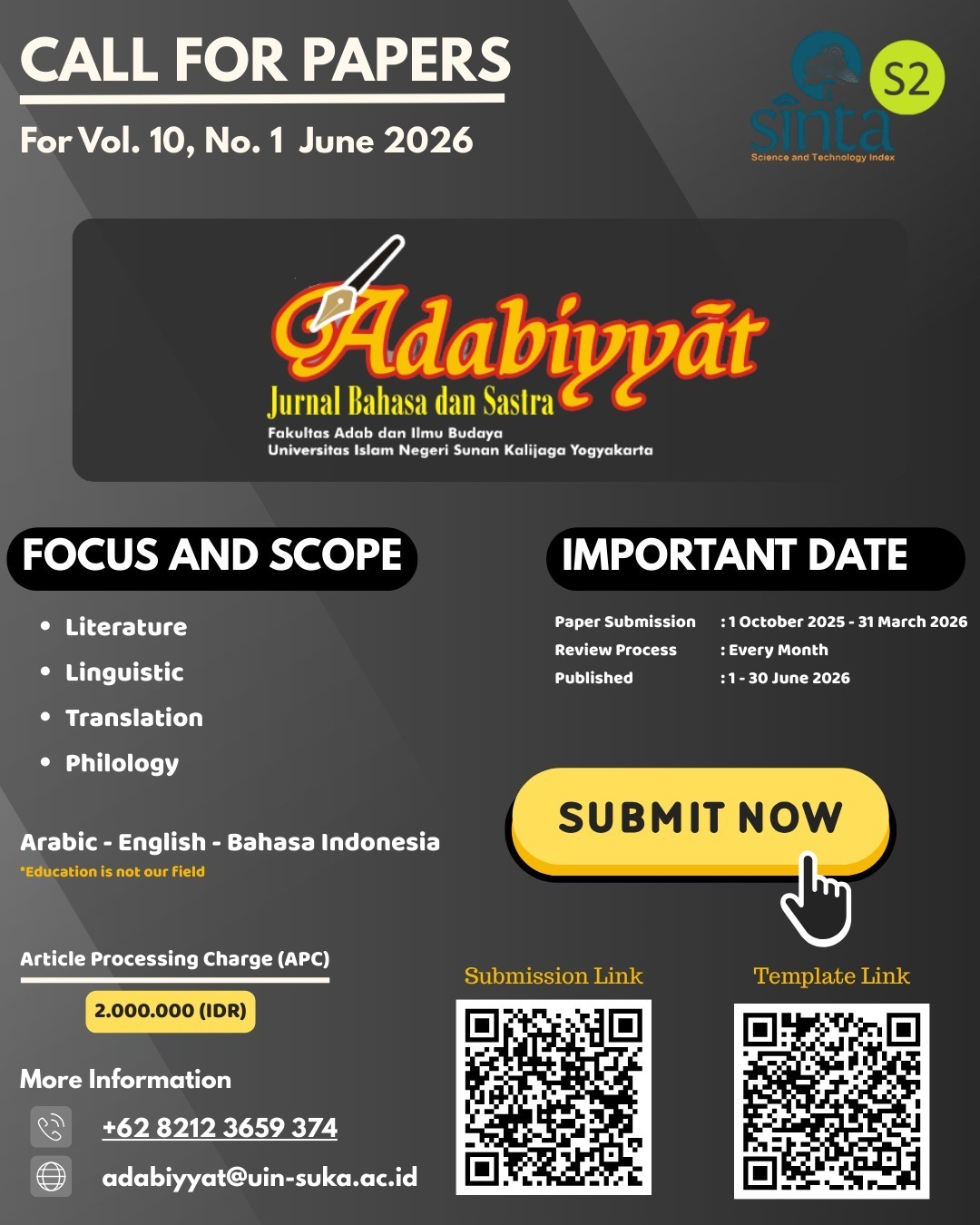SUBALTERN DAN NASIONALISME DALAM NOVEL NYAI DASIMA (1960) KARYA S. M. ARDAN
DOI:
https://doi.org/10.14421/ajbs.2021.05104الكلمات المفتاحية:
nationalism، subaltern، Gayatri Spivak، deconstruction، Nyai Dasimaالملخص
This paper analyzes new meanings as the results of the reception written by S.M. Ardan in Nyai Dasima, which is known to have a central meaning, generally refers to the colonial efforts to liberate Nyai Dasima from colonialism. Recognized as a victim of colonial social structures, Nyai Dasima yearns for liberation by restoring her position, maintaining her identity and self-respect by rebelling against colonial oppression based on indigenous woman nationalism. The theory used in this paper is Gayatri Spivak's critical reading of the subaltern, which refers to “third world women” who are considered unable to speak or have a voice. This analytical method is the deconstruction method to find what Spivak calls “cognitive failure”. The analysis of this paper found that the rebellion and resistance carried out by Nyai Dasima represent an act of liberation from the shackles of colonialism which suppresses subaltern groups, especially women. However, it was found that the exemption offered to Nyai Dasima was parole which in no way refers to a sovereign and privileged subject.
التنزيلات
المراجع
Ardan, S.M. & G. Francis. 2013. Nyai Dasima. Depok: Masup Jakarta.
Bahardur, Iswadi. 2017. “Pribumi Subaltern dalam Novel – Novel Indonesia Pascakolonial.” Jurnal Gramatika (Jurnal Penelitian Bahasa dan Sastra Indonesia). V3.i1 (89-100). ISSN: 2442-8485 http://ejournal.stkip-pgri-sumbar.ac.id/index.php/jurnal-gramatika/article/view/1876
Deni Saputra, Asep. 2011. “Perempuan Subaltern dalam Karya Sastra Indonesia Poskolonial.” LITERASI: Indonesian Journal of Humanities. Vol. 1, no. 1. ISSN 2088-3307 https://jurnal.unej.ac.id/index.php/LIT/article/view/649
Faruk. 2007. Belenggu Pasca-Kolonial: Hegemoni dan Resistensi dalam Sastra Indonesia. Yogyakarta: Pustaka Pelajar
Faruk. 2012. Metode Penelitian Sastra: Sebuah Penjelajahan Awal. Yogyakarta: Pustaka Pelajar
Guha, R. 1983. Elementary Aspects of Peasant Insurgency in Colonial India. Delhi: Oxford University Press India.
Kohn, Hans. 1984. Nasionalisme Arti dan Sejarahnya, Penj. Sumantri Mertodipuro, Jakarta: Erlangga.
Kusumawardani, Anggraeni & Faturochman. 2004. “Nasionalisme.” Buletin Psikologi. Tahun XII, No. 2, Desember 2004, ISSN: 0854 – 7108 https://jurnal.ugm.ac.id/buletinpsikologi/article/view/7469
Miftahuddin. “Nasionalisme Indonesia: Nasionalisme Pancasila”. Artikel dari Staf Pengajar Prodi Ilmu Sejarah, Jurusan Pendidikan Sejarah, FISE Universitas Negeri Yogyakarta. Diakses pada tanggal 16 September 2020 https://www.readcube.com/articles/10.21831%2Fmoz.v4i1.4386
Morton, Stephen. 2003. Gayatri Chakravorty Spivak. London & New York: Routledge.
Morton, Stephen. 2008. Gayatri Spivak: Etika, Subaltern, dan Kritik Penalaran Poskolonial. Perj Wiwin Indiarti. Yogyakarta: Paraton.
Morton, Stephen. 2007. “The Subaltern: Genealogy of a Concept”, dalam Gayatri Spivak, Ethics, Subalternity and the Critique of Postcolonial Reason. Malden: Polity.
Martaniah, S.M. 1990. Konsep dan Alat Ukur Kualitas Berbangsa dan Bernegara. Laporan Penelitian. Tidak diterbitkan. Yogyakarta: Fakultas Psikologi Universitas Gadjah Mada.
Setiawan, Rahmat. 2018. “Subaltern, Politik Etis, dan Hegemoni dalam Perspektif Spivak.” Poetika: Jurnal Ilmu Sastra, Vol. VI No. 1 Juli 2018 https://jurnal.ugm.ac.id/poetika/article/view/35013
Spivak, G. C. 1994. “Can the subaltern speak?” dalam P. Williams & L. Chrisman (eds), Colonial Discourse and Post-Colonial Theory. New York: Columbia University Press.
Spivak, G. C. 1990. The Post-Colonial Critic: Interviews, Strategies, Dialogues (Ed. Sarah Harasym). New York & London: Routledge.
Spivak, G. C. 1987. In Other Worlds: Essays in Cultural Politic. New York: Routledge.
التنزيلات
منشور
إصدار
القسم
الرخصة
الحقوق الفكرية (c) 2021 mcfulvia hy

هذا العمل مرخص بموجب Creative Commons Attribution-ShareAlike 4.0 International License.
- Adabiyyāt: Jurnal Bahasa dan Sastra publishes all articles entirely in full text.
- It is permissible for readers to download and to use it for scientific purposes and scientific dissemination.
- The author can re-publish the article that has been published by the Adabiyyāt: Jurnal Bahasa dan Sastra after obtaining written permission from the editor. This letter can be obtained by submitting a request letter for permission to republish the article to Adabiyyāt: Jurnal Bahasa dan Sastra via email adabiyyat@uin-suka.ac.id. In the second publication, the author is required to include information that the article was firstly published by the Adabiyyāt: Jurnal Bahasa dan Sastra.




















